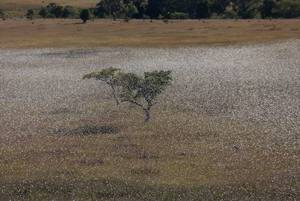'Uncontrolled' Locust Plague In Madagascar Could Trigger Food Crisis, UN Appeal Is ‘Severely Underfunded’ [VIDEO]

Madagascar is in the middle of an uncontrolled locust infestation, with more than half of the country riddled with the insects that destroy rice and corn crops. The U.N. Food and Agriculture Organization, or FAO, warns the plague can cause a serious food crisis, the organization said in a statement Wednesday.
The FAO estimates that by September two-thirds of the country will be infested by locusts. The organization has appealed for $22 million in funds needed by July to curb the crisis but said the program is “severely underfunded,” Reuters reports.
“If we don’t act now, the plague could last years and cost hundreds of millions of dollars. This could very well be a last window of opportunity to avert an extended crisis,” FAO Director-General José Graziano da Silva said in a statement.
In an island country where 80 percent of the population lives on less than a dollar per day, the locust plague could affect the security and lives of 13 million people, or roughly 60 percent of the country’s population, according to the FAO.
"There's already little rice. Not many people have more than 10 hectares of crops, so after the locusts, there's nothing left for our women and children to eat," Zefa Vilimana, a local farmer, told the Agence France-Presse. "The cattle have nothing left to eat either, so we're left with nothing once the locusts have been here."
Locusts resemble grasshoppers in appearance, but their behavior can be something entirely different. When environmental conditions induce breeding and produce green plants, locusts assemble in thick swarms that devastate crops, the National Geographic reports.
The current crisis in Madagascar is the worst the country has seen in 60 years. The FAO said that 25 percent of the total demand for rice production in Madagascar, roughly 630,000 metric tons, may be lost.
The organization has issued warnings about the locusts since last August, asking for financial support. Back when Madagascar was in the early stages of locust infestation, control of the pests would have cost 14.5 million in 2011-2012. At the time, the FAO received only half of the funding required.
Some local farmers have lost half of their crops from the locust swarms. "We buy pesticides against rice parasites ourselves, but it doesn't work against locusts. The government doesn't give us anything," Joseph Rakoto, a farmer from Ranohira, said.
© Copyright IBTimes 2024. All rights reserved.






















